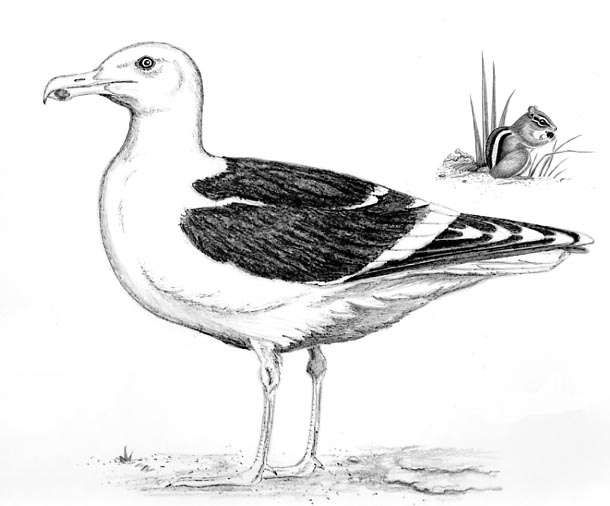
Dear Bird Folks,
A friend of mine saw an unusual thing the other day. He saw a seagull nab and eat a chipmunk. Isn’t that amazing? I know seagulls are omnivores, but isn’t it rare that one would eat a chipmunk?
John, Harwich
Good for you John,
Your take on the situation is dead on. Right now half of the people who are reading this column are thinking, “Oh my goodness, that poor little chipmunk. What an awful thing. I hate those mean gulls.” While the other half are thinking, “Sweet! It’s about time something helped us get rid of those rotten chipmunks. How can I attract that gull to my yard?” Good for you for not being a member of either group and not being judgmental about either creature. Seeing a gull nab a chipmunk is an amazing thing to witness. The gull wasn’t being “mean” and chipmunks certainly aren’t “rotten.” They both only do whatever it takes to get by and that’s the end of it, especially for the chipmunk.
Because I like you, John, I’m not going to give you my standard, “Don’t call gulls seagulls” lecture. We’ve all heard it from me before and even I’m getting tired of hearing it. The Cape has several species of gulls, all of them omnivores, but only a few have the ability to nab and eat something as large as a chipmunk. Since your friend didn’t identify which gull did the nabbing, I’m going to make the call and say that the chipmunk-eating gull was the ominous Great Black-backed gull. Dun, dun, duun!!
The Great Black-back, a very common bird in these parts, is by far the badest gull on the block and the largest gull in the entire world. The size and power of this massive bird are often overlooked because gulls are so familiar to us all that they become part of the landscape. The Great Black-backed Gull is much larger than birds we usually consider to be huge. These gulls are considerably larger than the burly Red-tailed Hawk or the fearsome-looking Great Horned Owl. They have a wingspan that exceeds that of a Canada Goose and they weigh more than 515 Ruby-throated Hummingbirds. Yet, we barely notice them.
When they invented the word “omnivorous,” they had this bird in mind. It eats everything and then some. It eats live fish, dead fish, cooked fish and on certain holidays, gefilte fish. These gulls eat clams, worms, berries, eggs, baby birds, adult birds, carrion, garbage, frogs, insects and now, thanks to your friend John, we can add chipmunks to that list. When a lucky gull catches a chipmunk, it not only gets the nutritional benefits of a tasty chipmunk, but it also gains the added bonus of the forty pounds of birdseed that the chipmunk has in its cheek pouches.
With their large bill, black-backs can easily pull apart large prey or hack out pieces of washed-up whales and other sea creatures. But, for the most part, this gull likes to swallow things whole. The list of food swallowed intact is sometimes hard to imagine. The Great Black-backed Gull has been seen swallowing an entire grackle, head, feathers and all. And I’m not talking about the little sissy grackles that we have here in New England. They would be nothing for this gull. I’m referring to those jumbo Boat-tailed Grackles from down South. If a Great Black-backed Gull is able to catch one of these large grackles, down the hatch it goes. Other things that make this gull’s one-bite-and-gone list are: puffins, Dovekies, other gull chicks, baby rabbits, and young hippos.
The ability to find food in every niche has served the Great Black-backed Gull well. The Herring Gull has seen a local decline in its population in recent years. Their decrease is probably due, in part, to the closing of landfills. Black-backs have not suffered the same decline and in some areas are even increasing. It appears that Great Black-backed Gulls aren’t as dependent on a daily ration of fresh trash as the Herring Gulls may be.
As to whether it’s rare for a gull to eat a chipmunk, I would have to say it’s probably not very common. I don’t know of any official gull vs. chipmunk tallies, but since black-backs and chippies typically don’t occupy the same habitat, the odds of regular encounters are fairly low. For the most part Black-backed Gulls are creatures of beaches, tidal pools and French fry-filled parking lots of fast food restaurants. Chipmunks like open woodlands, stonewalls and hanging out underneath bird feeders, which is their version of being in the parking lot of a fast food restaurant.
Your friend was rather lucky, John, to witness such a dramatic scene from nature. And just in case you are feeling bad for the chipmunk, keep in mind that it gave its life so some French fries could live. A very noble cause indeed.